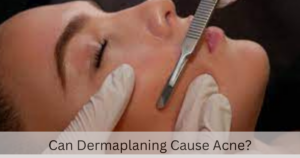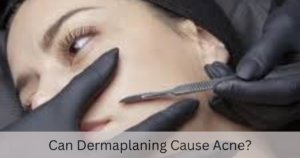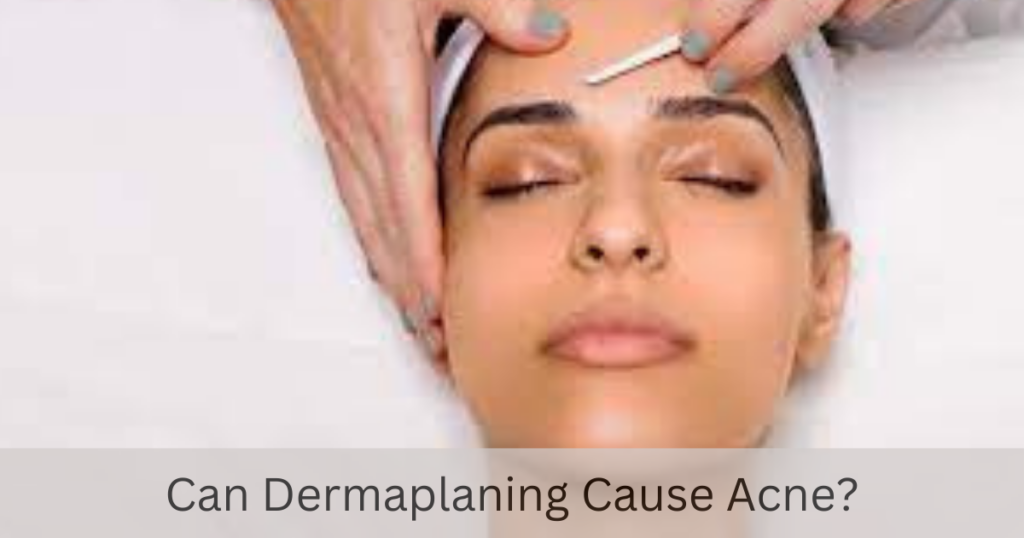Dermaplaning, a popular skincare procedure, has gained significant attention for its ability to exfoliate the skin and promote a smoother complexion. However, amidst the buzz surrounding its benefits, a common concern arises: can dermaplaning cause acne? Let’s delve into this question to uncover the truth behind dermaplaning and its potential effects on acne-prone skin.

Understanding Dermaplaning
Dermaplaning is a non-invasive cosmetic procedure designed to exfoliate the skin and remove fine vellus hair, commonly known as “peach fuzz.” Unlike traditional exfoliation methods that utilize chemical peels or abrasive scrubs, dermaplaning employs a surgical scalpel to gently scrape away dead skin cells and unwanted facial hair. This meticulous process reveals a smoother, more radiant complexion by effectively eliminating surface imperfections.
The Dermaplaning Process: Step by Step
- Preparation: Before commencing the dermaplaning procedure, your skincare professional will thoroughly cleanse your skin to remove any traces of makeup, oil, or impurities. This ensures optimal results and minimizes the risk of post-treatment complications.
- Exfoliation: Once your skin is prepped, the dermaplaning process begins. Using a sterile surgical scalpel held at a precise angle, your skincare specialist will gently glide the blade across the surface of your skin, systematically removing dead skin cells and fine facial hair. This meticulous technique ensures thorough exfoliation while minimizing discomfort and irritation.
- Precision and Technique: Dermaplaning requires a skilled hand and careful precision to achieve optimal results. Your skincare professional will work methodically, paying close attention to areas prone to roughness or uneven texture, such as the cheeks, chin, and forehead. Throughout the procedure, they’ll maintain gentle yet controlled movements to ensure safety and efficacy.
- Post-Treatment Care: Once the dermaplaning process is complete, your skin may appear slightly pink or flushed, which is normal and typically subsides within a few hours. Your skincare specialist will apply a soothing moisturizer or serum to replenish hydration and nourish the skin. Additionally, it’s essential to follow any post-treatment recommendations provided by your skincare professional to maximize results and promote optimal face skin regeneration.

Can Dermaplaning Cause Acne? Benefits of Dermaplaning
Dermaplaning offers a myriad of benefits for individuals seeking to improve the appearance and texture of their skin, including:
- Smoothing Texture: By removing dead skin cells and surface debris, dermaplaning promotes a smoother, more refined skin texture, imparting a youthful glow.
- Enhancing Product Absorption: Exfoliated skin is more receptive to skincare products, allowing for better penetration of serums, moisturizers, and other treatment products.
- Diminishing Fine Lines and Wrinkles: Dermaplaning can help reduce the appearance of fine lines and wrinkles, resulting in a more youthful and rejuvenated complexion.
- Minimizing the Appearance of Pores: Through thorough exfoliation, dermaplaning helps minimize the appearance of enlarged pores, creating a more even skin tone and texture.
The Mechanism of Acne Formation
To comprehend whether dermaplaning can cause acne, it’s crucial to grasp the mechanisms behind acne formation. Acne occurs when hair follicles become clogged with oil and dead skin cells, leading to the development of pimples, blackheads, and whiteheads. Factors such as excess oil production, hormonal fluctuations, and bacterial proliferation contribute to the formation and exacerbation of acne.
Dermaplaning and Acne: Separating Fact from Fiction
Contrary to common misconceptions, dermaplaning, when performed by a trained professional using proper techniques and sterile instruments, typically does not cause acne. It can be beneficial for individuals with acne-prone skin. By effectively removing the buildup of dead skin cells and excess sebum, dermaplaning can help prevent pore blockages and reduce the likelihood of acne breakouts.
Potential Considerations for Acne-Prone Skin
While dermaplaning can be advantageous for individuals with acne-prone skin, there are some considerations to keep in mind:
- Professional Expertise: It’s essential to seek dermaplaning treatments from licensed professionals with expertise in skincare. Improper technique or excessive pressure during the procedure can potentially irritate the skin, leading to inflammation and breakouts.
- Post-Treatment Skincare: Following dermaplaning, it’s crucial to adhere to a gentle skincare routine tailored to your skin type. Avoid using harsh exfoliants or products containing comedogenic ingredients that may exacerbate acne.
- Hygiene Practices: Ensure that all instruments and surfaces used during dermaplaning procedures are adequately sterilized to minimize the risk of bacterial contamination, which can potentially trigger acne flare-ups.
Conclusion:
In conclusion, dermaplaning, when performed correctly, is unlikely to cause acne and can be beneficial for individuals seeking to improve the appearance of their skin. By effectively exfoliating the skin and removing surface debris, dermaplaning can help reduce the risk of pore blockages and acne breakouts. However, it’s essential to prioritize professional expertise, proper skincare maintenance, and hygiene practices to ensure optimal results and minimize the risk of adverse reactions.

